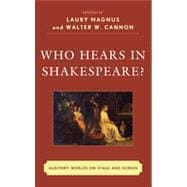
Note: Supplemental materials are not guaranteed with Rental or Used book purchases.
Purchase Benefits
| Acknowledgments | p. ix |
| Introduction Laury Magnus and Walter W. Cannon, Shakespeare's Auditory World: Text, Stage, and Screen | p. xi |
| The poetics of hearing and the early modern stage | |
| Andrew Gurr, Why Was the Globe Round? | p. 3 |
| James Hirsh, Guarded, Unguarded, and Unguardable Speech in Late Renaissance Drama | p. 17 |
| Walter W. Cannon, Hearing Complexity: Speech, Reticence, and the Construction of Character | p. 41 |
| Jennifer Holl, "If This Be Worth Your Hearing": Theorizing Gossip on Shakespeare's Stage | p. 61 |
| Metahearing: hearing, knowing, and audiences, onstage and off | |
| Laury Magnus, Mimetic Hearing and Meta-Hearing in Hamlet | p. 83 |
| David Bevington, Hearing and Overhearing in The Tempest | p. 101 |
| J. Anthony Burton, Asides and Multiple Audiences in The Merchant of Venice | p. 113 |
| Kathleen Kalpin Smith, Negotiating Audiences: Speech and Reception in All's Well That Ends Well and Henry V | p. 131 |
| Beraice W. Kliman, Hearing Power in Measure for Measure | p. 145 |
| Nova Myhill, "Hark, a Word in Your Ear": Whispers, Asides, and Interpretation in Troilus and Cressida | p. 163 |
| Transhearing: hearing, overhearing, whispering, and eavesdropping in film and other media | |
| Philippa Sheppard, "Mutes or Audience to This Act": Eavesdroppers in Branagh's Shakespeare Films | p. 181 |
| Gayle Gaskill, Overhearing Malvolio for Pleasure or Pity: The Letter Scene and the Dark House Scene in Twelfth Night on Stage and Screen | p. 199 |
| Erin Minear, "But Mark His Gesture": Hearing and Seeing in Othello's Eavesdropping Scene | p. 219 |
| Afterword Stephen Booth, Who Doesn't Listen in Shakespeare? | p. 235 |
| Index | p. 241 |
| Contributors Biographies | p. 247 |
| Table of Contents provided by Ingram. All Rights Reserved. |
The New copy of this book will include any supplemental materials advertised. Please check the title of the book to determine if it should include any access cards, study guides, lab manuals, CDs, etc.
The Used, Rental and eBook copies of this book are not guaranteed to include any supplemental materials. Typically, only the book itself is included. This is true even if the title states it includes any access cards, study guides, lab manuals, CDs, etc.